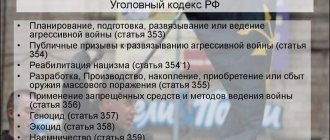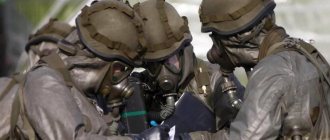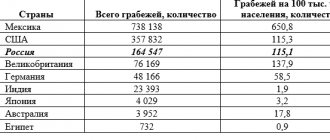There are many different crimes for which liability and punishment are established in the provisions of the Criminal Code of the Russian Federation. Their most dangerous and widespread forms are described in Chapter 34 and they relate to crimes against the peace and security of mankind. Yes, it is with this wording that the legislation of our country considers such acts, and the degree of responsibility for their commission will be discussed in this article.
Responsibility for planning, preparing, initiating or waging aggressive war.
General provisions
Due to the fact that war involves the conduct of large-scale military operations that cover more than one state, the object of this crime is the peaceful coexistence of states. Since it was already mentioned above that war always has large-scale consequences, there are many international legal acts condemning such acts and establishing responsibility for their commission. One such act is the Kellogg-Briand Pact, also better known as the Paris Pact.
In August 1928, French Foreign Minister Aristide Briand and US Secretary of State Frank Billings Kellogg signed this pact, establishing treaty obligations to renounce military action as a tool/tool for solving national politics. The “Paris Pact” was signed on August 27 by representatives of 15 states, which were later joined by all other active countries. After which many more agreements, pacts, codes and other documents were concluded on mutual non-aggression, the inadmissibility of aggression, etc.
But, as is known from subsequent history, no international treaties and agreements ensure the safety and fulfillment of the obligations achieved.
Criminal Code
From international agreements we should move on to the provisions of the current criminal legislation in Russia. Within the framework of the Criminal Code of the Russian Federation there is an article numbered 353, consisting of literally four lines, namely:
- Planning, preparing or unleashing an aggressive war is punishable by imprisonment for a term of seven to fifteen years.
- Waging an aggressive war is punishable by imprisonment for a term of ten to twenty years.
Unfortunately, the concept of “war” is familiar to almost everyone, but the concept of “aggressive war” is not familiar to everyone.
In 1974, Article 1 of UN General Assembly Resolution 3314 (XXIX) clarified this concept, which is as follows: “A war of aggression is the use of armed force by a State against the sovereignty, territorial integrity or political independence of another State, or in any other manner.” inconsistent with the Charter of the United Nations as defined in this definition."
In connection with all of the above, it is worth noting that the objective side of the crime in question consists of three alternative options:
- "Planning". Covers any actions aimed at solving organizational issues necessary to carry out the crime, for example:
- development of plans (strategic, financial, tactical) and instructions;
- determining the timing of military engagements (operations);
- attracting hired staff;
- implementation of deployment activities;
- determination of strike locations, etc.
- "Preparation". In contrast to the above stage, the preparation stage is the most open in nature and the actions carried out in this case are characterized by the following:
- hidden or open increase in the number of troops;
- contraction (redeployment) of combat force to the borders of another state;
- implementation of measures aimed at provoking armed clashes;
- sending sabotage groups;
- acquisition of weapons and equipment, including those intended for mass destruction of manpower.
- "Untying" In the previously mentioned Resolution 3314, Article 3 provides a rather redundant explanation of the actions that qualify as this stage:
- an invasion or attack by the armed forces of one state on the territory of another state or any military occupation. At the same time, the time intervals of these events are not of key importance;
- any form of annexation of the territory of the defending state;
- bombing by the armed forces of a state of the territory of another state or the use of any weapons by one state against the territory of another state;
- blockade of ports and coasts of a state by the armed forces of another state; an attack by the armed forces of one state on the land, sea or air forces and fleets of another state;
- an attack by the armed forces of one state on the land, sea or air forces and fleets of another state; the use of the armed forces of one state located on the territory of another state in violation of the conditions provided for in the agreement, or the continuation of stay after the termination of the agreement;
- provision by a state of territory to another state for committing aggression against a third state;
- dispatch by the state or on behalf of the state of armed bands, groups, irregular forces or mercenaries who carry out acts of use of armed force against another state that are tantamount to armed aggression.
- "Leading". This stage, in fact, is a direct continuation of the outbreak of an aggressive war.
Accordingly, the above list is not exhaustive and other acts of aggression may also be included.
The composition of part 2 presupposes the continuity of the commission of the crime in question. For persons who did not participate in the acts provided for in Part 1, these provisions are qualified as an independent crime, and for those who directly participated in the planning, preparation and outbreak of war, they are considered as a qualifying feature. Of course, ordinary ordinary citizens cannot declare war on another state, which creates the presence of a special subject in the above provisions. They can only be persons who are vested with the constitutional right to resolve such issues, and the list of positions and available powers is established:
Federal Law dated May 27, 2003 N 58-FZ “On the civil service system of the Russian Federation”, Decrees of the President of the Russian Federation dated January 11, 1995 N 32 “On public positions of the Russian Federation”, as well as Federal Law dated December 31, 2005 N 1574 “On the Register of Federal Positions” state civil service.
Second commentary to Art. 353 of the Criminal Code of the Russian Federation
1. The object of this crime is peace and peaceful coexistence of states.
2. The objective side of the crime provided for in Part 1 of Art. 353 of the Criminal Code, form three types of socially dangerous actions:
1) planning an aggressive war;
2) its preparation;
3) untying it.
The concept of aggression (war of aggression) is defined in decisions of the UN General Assembly, in particular, in a special resolution of December 14, 1974. Preparation for an aggressive war is actions aimed at ensuring the corresponding plans. The unleashing of an aggressive war is the beginning of concrete actions to wage it.
3. The subject of this crime is a person holding the highest public position of the Russian Federation or a subject of the Russian Federation.
4. The subjective side of the crime in question is characterized by direct intent.
5. Part 2 art. 353 of the Criminal Code provides for a qualified element of this crime, the objective side of which is characterized by the waging of an aggressive war, i.e., in contrast to the outbreak of the latter, its continuation.
Public appeals
Taking into account the particular danger of implementing this act, it is extremely important to stop its commission even at the stage of preparation and calls, since such plans can only be achieved with certain support. And as is known from the current legislation, any public calls to commit illegal acts are punishable by the Criminal Code of the Russian Federation. Within the framework of the question that interests us, this is the responsibility of the provisions of Article 354 of the Criminal Code of the Russian Federation, which look as follows:
- Public calls to unleash an aggressive war are punishable by a fine in the amount of up to three hundred thousand rubles or in the amount of the wages or other income of the convicted person for a period of up to two years, or by imprisonment for a term of up to three years.
It is immediately worth noting that, unlike Article 353 of the Criminal Code of the Russian Federation with a special subject, here an individual who has reached the age of 16 can be found guilty.
In essence, public calls mean propaganda of war, the inadmissibility of which is established in Art. 20 of the International Covenant on Civil and Political Rights of December 19, 1966. Accordingly, the objective side of this crime is characterized by any acts bearing any form of public call for the outbreak of an aggressive war, and the subjective side is direct intent and awareness of the illegality and inadmissibility of the actions being carried out.
For example, let’s assume the following situation: A large-scale rally with the participation of 10,000 people was taking place in the city “N”. His main agenda was the disagreement of those gathered with the actions that were carried out by representatives of the foreign state “W”. These contested actions were of a provocative nature, the purpose of which was to force our state to get involved in hostilities that obviously did not promise anything good for Russia. “The unspoken mouthpiece of the will of the people” became a certain citizen “A”, acting as general director in the commercial corporation “N”, which is engaged in a rather dubious type of activity. This citizen, standing behind a podium in the city square, using a loudspeaker, began to escalate the situation in every possible way and call on those gathered, as well as the administrative staff of the state, to unleash an aggressive war against the provocateurs. During his speech, citizen “A” more than once said that there was simply no other outcome other than active military action to solve the problems and issues raised, which was supported by a huge number of protesters.
It is necessary to understand that, despite the similarity of this composition with the crime of incitement, these actions cannot form a cumulative qualification. Incitement is characterized by targeted influence on a specific person or group of persons, carried out with the aim of attracting them to commit an illegal act. And since public (open) calls are always guided by the quantitative criterion that there are simply no signs of incitement.
- The same acts committed using the media or by a person holding a public office of the Russian Federation or a public office of a constituent entity of the Russian Federation are punishable by a fine in the amount of one hundred thousand to five hundred thousand rubles or in the amount of the wages or other income of the convicted person for a period of one year. up to three years or imprisonment for up to five years with deprivation of the right to hold certain positions or engage in certain activities for up to three years.
Part 2 has qualifying features in the form of the guilty person holding public office or being used as a tool to reach a wider media audience. It is very important to understand that liability under Part 2 of Art. 354 of the Criminal Code of the Russian Federation is borne not only by persons who directly made a public appeal in the media, but also by citizens who directly participated in the preparation of the material and gave permission for its broadcast.
Illegal crossing of the State border of the Russian Federation
It is objectively expressed in crossing the protected State border of the Russian Federation without established documents and proper permission.
The concept of the State Border of the Russian Federation is defined in the Law of the Russian Federation “On the State Border of the Russian Federation”.
Article 322 of the Criminal Code refers only to the protected State Border of the Russian Federation, i.e. closed, the free crossing of which is prohibited, the procedure for entry and exit through checkpoints has been established, border guards are carried out, including non-military ones - using border guards. When resolving issues of criminal liability under Art. 322 of the Criminal Code of the Russian Federation, the awareness of citizens about the protection of a specific border, as well as the possibility of perceiving it as protected, is important. If there are no obvious signs of border guards (posts, patrols, etc.), there are no visible external signs of the State Border - marking of its line, corresponding symbols and signs, other equipment typical for the border, then there are objective prerequisites for innocently crossing it.
Crossing the protected State Border is considered illegal in the criminal law sense if there are no established documents and (or) proper permission.
Established documents are valid documents for the right of persons to enter the Russian Federation or leave the Russian Federation.
Thus, for citizens of the Russian Federation the following are established: passport of a citizen of the Russian Federation (so-called foreign passport); diplomatic passport; service passport; seaman's passport (sailor's identity card). These are the main documents identifying a citizen of the Russian Federation outside its territory.
Relevant documents are established for foreign citizens and stateless persons.
With a simplified (visa-free) procedure for entry and exit of citizens of the Russian Federation and a neighboring state, the documents are determined by the agreement of the Russian Federation with the neighboring state.
The preparation of documents for the right to leave the Russian Federation and enter the Russian Federation is carried out, within their competence, by the bodies of the Ministry of Internal Affairs and the Ministry of Foreign Affairs of the Russian Federation on the territory of the Russian Federation or by diplomatic missions or consular offices of the Russian Federation abroad.
Proper permission is associated with the issuance of valid documents to a person for the right to leave the Russian Federation or enter the Russian Federation, the absence of a decision of the competent authority on a temporary ban or restriction on the entry or exit of a specific person, with notification of this, and finally, the procedure for allowing persons through the State Border of the Russian Federation . The permission given by representatives of the border service authorities, if there is a basis for crossing the border, consists of: a) in relation to persons leaving the Russian Federation, permission to cross the State Border; b) in relation to persons arriving from abroad - in recognizing the legality of their crossing of the State Border.
Military personnel (except for those serving on conscription) leave the Russian Federation with permission from the command, issued in the manner established by the Government of the Russian Federation.
There are also special cases in which a different procedure for passing persons across the State Border of the Russian Federation applies. It applies to military personnel of the Federal Border Service in the performance of their duties to protect the State Border, rescuers crossing the State Border to localize and eliminate emergency situations, as well as persons forced to cross the State Border due to emergency circumstances.
The crime is considered completed from the moment of actual crossing of the State Border of the Russian Federation without established documents and (or) proper permission.
It should be kept in mind that preparation for this crime is not punishable (see Part 2 of Article 30 of the Criminal Code of the Russian Federation).
Part 2. Crossing the State Border of the Russian Federation upon entry into the Russian Federation by a foreign citizen or a stateless person whose entry into the Russian Federation is known to be not permitted for the culprit on the grounds provided for by the legislation of the Russian Federation -
Part 3 Art. 322 of the Criminal Code of the Russian Federation provides for the commission of this crime in the presence of qualifying criteria:
1) by a group of persons by prior conspiracy or an organized group (Article 35 of the Criminal Code); 2) with the use of violence or the threat of its use.
In the second case, we are talking about physical or mental violence against persons who prevent or may prevent illegal border crossing. If the use of violence contains a sign of another crime, for which a more severe punishment is provided than under Art. 322 of the Criminal Code, then the act is qualified in its entirety.
The subjective side of the crime is characterized by guilt in the form of direct intent. The person realizes that he is illegally (without established documents and proper permission) crossing the protected State Border of the Russian Federation, and wants to commit such an act.
The motives and goals of the act are not signs of this composition and are taken into account when individualizing the punishment. Subject is any sane person who has reached the age of 16.
According to the note to Art. 322 of the Criminal Code of the Russian Federation, its effect does not apply to cases of foreign citizens and stateless persons arriving in Russia in violation of the rules for crossing the State Border of the Russian Federation to exercise the right of political asylum in accordance with the Constitution of the Russian Federation (Article 63), unless the actions of these persons contain another crime .
89
.
Planning, preparation, unleashing or waging an aggressive war (Article 353 of the Criminal Code).
The article provides for two types of crimes encroaching on the same object.
Object
the crime provided for in Part 1 of Art.
353 of the Criminal Code is the peaceful coexistence of states and peoples. The social danger of
planning, preparing, unleashing or waging an aggressive war is that it leads to a violation of the peaceful coexistence of peoples and states, to unpredictable human casualties and unjustified, irreparable material costs, to incredible suffering of the civilian population, especially women and children, to destruction or destruction of national economic objects, architectural monuments and other cultural values.
From the objective side
the corpus delicti of the crime in question is expressed in the planning, preparation and unleashing of an aggressive war.
War planning
means drawing up appropriate mobilization and organizational-technical plans and projects, developing appropriate calculations of the needs for human, material, technical and other resources, developing plans for waging war as a whole and carrying out individual military operations, etc. From the subjective side, what is
being
considered a crime can only be committed with
direct intent.
The motives for this crime may be interstate hostility, falsely understood national interests of the country, as well as personal considerations.
Subjects
This crime can only be committed by persons holding, by election or appointment, the highest public positions in the civil service of the Russian Federation, as well as persons occupying the highest public positions in the civil service of the constituent entities of the Russian Federation. The list of such positions is established by the Federal Law “On the Fundamentals of the Civil Service of the Russian Federation” dated July 31, 1995* and the corresponding decrees of the President of the Russian Federation, as well as legislative acts of the constituent entities of the Russian Federation.
An object
composition of waging aggressive war, provided for in Part 2 of Art. 353 of the Criminal Code, the same.
From the objective side
This crime is expressed in
waging an aggressive war,
which is understood as carrying out military operations against another state using all types of weapons or a limited set of them.
Military operations can be expressed in an unjustified invasion or attack by the Armed Forces on the territory of another state or in the military occupation of the territory or part of the territory of another state, in bombing by the Armed Forces. From the subjective side
this crime is characterized
by direct intent.
Subjects
waging an aggressive war can only be carried out by persons occupying the highest government positions in the civil service of the Russian Federation, who, in accordance with the Constitution of the country, are competent to make decisions on waging or ending the war.
Planning, preparation, initiation or waging of aggressive war
Planning, preparation, unleashing or waging an aggressive war ( Article 353 of the Criminal Code
). The article provides for two types of crimes encroaching on the same object. The object of the crime provided for in Part 1 of Art. 353 of the Criminal Code is the peaceful coexistence of states and peoples. The social danger of planning, preparing, unleashing or waging an aggressive war is that it leads to a violation of the peaceful coexistence of peoples and states, to unpredictable human casualties and unjustified, irreparable material costs, to incredible suffering of the civilian population, especially women and children, to destruction or destruction of national economic objects, architectural monuments and other cultural values. From the objective side, the corpus delicti of the crime in question is expressed in the planning, preparation and unleashing of an aggressive war. War planning means the drawing up of appropriate mobilization and organizational-technical plans and projects, the development of appropriate calculations of the needs for human, material, technical and other resources, the development of plans for waging war as a whole and the implementation of individual military operations, etc. Preparation for an aggressive war involves the actual implementation of a set of measures and activities of an organizational, military and logistical nature in order to ensure readiness for the start of military operations.
The subjects of this crime can only be persons holding, by election or appointment, the highest public positions in the civil service of the Russian Federation, as well as persons occupying the highest public positions in the civil service of the constituent entities of the Russian Federation. From the objective side, this crime is expressed in waging an aggressive war, which is understood as carrying out military operations against another state using all types of weapons or a limited set of them. Military operations may be expressed in an unjustified invasion or attack by the Armed Forces on the territory of another state or in the military occupation of the territory or part of the territory of another state, in the bombardment of the territory of another state by the Armed Forces or in the use of any weapons against the territory of another state, in a blockade of ports or coasts of another state Armed Forces, in an attack by the Armed Forces on the land, sea or air fleets of another state, etc. From the subjective side, this crime is characterized by direct intent. The subjects of an aggressive war can only be persons occupying the highest government positions in the civil service of the Russian Federation, who, in accordance with the Constitution of the country, are competent to make decisions on waging or ending a war.
90
.
Mercenary - provided for in Art.
359 of the Criminal Code of the Russian Federation, a crime against the peace and security of mankind, consisting of the recruitment, training, financing or other material support of a mercenary, the use of a mercenary in an armed conflict or military actions, as well as the participation of the mercenary himself in an armed conflict or military actions. According to the 1989 Convention on the Prohibition of the Recruitment, Use and Training of Mercenaries, the actions of not only the mercenaries themselves, but also the persons who recruit, train, finance and use them are considered criminal and subject to punishment.
Mercenary
is recognized as a person who acts for the purpose of receiving material reward and is not a citizen of a state participating in an armed conflict or hostilities, does not reside permanently on its territory, and is not a person sent to perform official duties. This definition of a mercenary is given in approx. to Art. 359 of the Criminal Code of the Russian Federation and fully complies with Art. 47 Additional Protocol I to the Geneva Conventions of 1949 (see International Protection of Human Rights and Freedoms. M., 1990, pp. 570-658) and the Convention on the Prohibition of the Recruitment, Use, Financing and Training of Mercenaries of 1989.
Recruitment of mercenaries refers to the recruitment of people to participate in an armed conflict or hostilities for a certain material reward. The terms of employment can be determined either in writing (in the form of an agreement) or orally.
Training of mercenaries means conducting special classes with them on the most effective and expedient application and use of weapons, ammunition, the design of military equipment, combat tactics in certain terrain conditions, time of day and year.
Financing mercenaries is considered to be providing them with funds.
Other material support for mercenaries should be understood as equipping them with uniforms for the season, providing them with the appropriate types of military weapons and ammunition, as well as vehicles or other means of transportation, etc.
The use of a mercenary in an armed conflict or hostilities means their direct involvement in combat operations or military actions both in the combat area and beyond.
The subject of the crime may be persons authorized by state bodies or military authorities acting on the side of the recruiting power, as well as private individuals acting on their own initiative.
Mercenary activity is committed only if there is direct intent.
The participation of a mercenary in an armed conflict or hostilities means the direct participation of a mercenary in military actions and operations during a military conflict or hostilities.
A mercenary who has reached the age of 16 and is of sanity can be recognized as a subject.
This crime can only be committed intentionally, the motive is selfish.
33 question no







